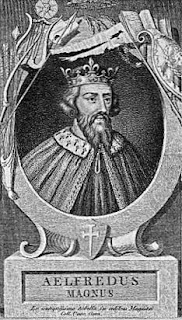- He was born in Wantage, then in Berkshire, now in Oxfordshire. He was the son of King Aethelwulf of Wessex, and his mother's name was Osburh.
- There is a story which says that, at the age of four, Alfred was sent to Rome to be confirmed by Pope Leo IV, who "anointed him as king", in preparation for his eventual succession to the throne of Wessex. However, this seems unlikely as Alfred had three living elder brothers, Æthelbald, Æthelberht and Æthelred. All three of his brothers were king before him.
- His biographer wrote that Alfred didn't learn to read until he was at least twelve. However, if that's true, he soon made up for it. His mother offered a book of poems to whichever of her children was first to memorise it, and Alfred won.
- Alfred became king when his youngest elder brother Æthelred died in 871. This was despite the fact that Æthelred had two sons. Alfred became king over the two sons because of an agreement the brothers had made earlier in the year, that whichever one of them outlived the other would inherit all their father's land, originally shared between them. Although it wasn't stated specifically, it was understood that the kingship was included in the agreement. In any case, England was at the time fighting off repeated invasions by the Danes and Æthelred's sons were very young when he died – so nobody argued.
- So what was he like? We don't have any portraits of him from his lifetime, so we can't be sure what he looked like. We do know he wasn't, as you might expect from a great warrior, big and tough looking. He was actually a bit weedy and suffered with his health. Modern doctors, reading accounts of his symptoms, believe he may have suffered from Crohn's disease. He was, however, courageous, clever and an excellent leader.
- He is famous for defending Britain against the Danes. He's also famous for burning cakes. At one point, the Danes had the upper hand and Alfred was in hiding, sleeping in rough caves and looking rather the worse for wear. He used to beg for food in the cottages he passed. One day, a woman told him he could have some of the cakes she was baking if he watched them and made sure they didn't burn while she was out looking after her Cows. Alfred had a lot on his mind, like how he was going to defeat the Danes, so he did let the cakes burn. The woman returned, and, not having any idea who this apparently ragged beggar really was, sent him on his way with a telling off and no cakes!
- He is also sometimes referred to as King Alfred the Minstrel. The story behind this is that he once disguised himself as one so he could sneak into a Danish camp and spy on them. He was sufficiently good that he was summoned to the tent of the Danish commander, Guthrum, to play for him. Guthrum showered Alfred with gifts, including one he never meant to give – information. Alfred's forces won the battle and Guthrum was brought before Alfred as a prisoner. Alfred could, of course, have slaughtered Guthrum and all his men, but he didn't. Guthrum had treated him well while he was disguised as a minstrel, so Alfred said he would let them all go on one condition, that they all became Christians. Alfred allowed the Danes to settle in East Anglia and they all lived peacefully for many years.
- So what did Alfred the Great ever do for us? He restored London after years of attacks by the Vikings, giving the city a new street plan and beefed up the fortifications. Some say he invented the British navy. He didn't – Britain already had one, but he did order the construction of bigger and better ships. He was also known for his legal reform, writing a whole new law book based on the Ten Commandments, the book of Exodus and the Acts of the Apostles. He promoted education and the use of the English language, rather than Latin in schools.
- In 868 Alfred married Ealhswith, daughter of a Mercian nobleman. They had five or six children, including Edward the Elder who succeeded his father as king.
- He died in 899 from unknown causes, aged about 50. Known for his Christian faith, Alfred is venerated as a saint by some Christian traditions. Henry VI of England tried to have Alfred made a saint, but failed. Nevertheless, the Anglican church venerates him as a Christian hero, with a feast day or commemoration on 26 October.
More details about my books. Follow this link if you like Superheroes, Psychics and/or quirky short stories.
I've listed the themes each novel touches on here for easy reference.
Like my author page on Facebook for news on new books and blog posts.


No comments:
Post a Comment